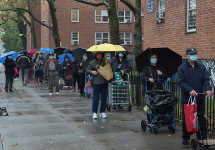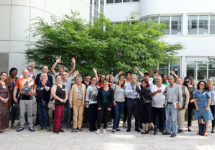
It is in this context that the Evaluation Committee for the prevention and fight against poverty, chaired by Louis Schweitzer and led by France Stratégie, is publishing its 2021 report. The report presents new conclusions on the implementation of the Strategy and the first available elements concerning its evaluation, reviews the points the Committee wishes to bring to the attention of the public authorities concerning their anti-poverty policy, and makes recommendations.
The Evaluation Committee consulted, as it has done since the start of its work in autumn 2019, the “college” of persons in poverty or precarious situations (5th college) of the “Conseil national des politiques de lutte contre la pauvreté et l’exclusion sociale (CNLE)” (National council against poverty and social exclusion) and the citizen’s panel. It also relied on hearings with experts and the administrations and public bodies concerned by the Strategy.
This report follows a methodological progress note published in March 2020.
The Strategy has two main objectives: to avoid the social reproduction of poverty and to enable people to escape poverty. The Committee decided to assess it also in the light of a third objective, which has been the subject of a commitment by France to the United Nations since 2015: to leave no one in a situation of extreme poverty.
The Committee raises six points for attention: better understanding and monitoring extreme poverty; combating the effects of the coronavirus crisis on poverty; strengthening efforts to combat non-take-up of benefit entitlements; helping the most deprived 18- to 24-year-olds; assessing the effectiveness of guidance in its entirety; and speeding up the implementation of the 5 years "Housing First" plan.
It also makes 10 recommendations:
Provide the means to evaluate the Strategy and ensure continuity in anti-poverty policy.
Recommendation 1: Rapidly establish a definition of extreme poverty that can be measured by INSEE to determine the number of people concerned, combining monetary poverty with other criteria.
Recommendation 2: Increase the resources of the Interministerial Delegation for the Prevention of and Fight against Poverty (Délégation interministérielle à la prévention et à la lutte contre la pauvreté -DIPLP) so that it can ensure adequate monitoring of a policy on the scale of the Strategy.
Recommendation 3: Have the means to systematically monitor the Strategy's measures.
Recommendation 4: Ensure continuity in the fight against poverty and only question measures if experience, validated by a scientific study, shows that their effectiveness is not commensurate with the means implemented.
Recommendation 5: Continue the evaluation beyond 2022 and fill in the data gaps to develop evaluation indicators, particularly for measures concerning children and young people.
Strengthen the fight against territorial inequalities.
Recommendation 6: Clearly affirm the inter-ministerial positioning of the anti-poverty commissioners and strengthen their administrative support.
Recommendation 7: Rapidly examine the possibility of extending State financing of the guaranteed minimum income (Revenu de solidarité active – RSA) to départements facing financial difficulties, as has already been done and is provided for on an experimental basis by the bill "on differentiation, decentralisation, devolution and various measures to simplify local public action".
Strengthen the fight against non-take-up.
Recommendation 8: Continue the fight against non-take-up of welfare benefits by systematically evaluating the effectiveness of policies on access to rights, by rapidly extending the measures whose effectiveness has been demonstrated, and by rapidly and widely mobilising the possibilities opened up by Article 82 of the Law on the Financing of Social Security (LFSS) for 2021.
Recommendation 9: Resume consultations on universal activity income (Revenu universel d’activité – RUA) so that a benefit of this type can be introduced as soon as possible.
Experiment with a basic income for the most disadvantaged 18- to 24- year-olds.
Recommendation 10: The information already available is sufficient to recommend immediate experimentation with the introduction of a monetary benefit for the most disadvantaged 18- to 24-year-olds in education, in low-paid employment or seeking employment, in order to observe the real effects of such a policy and to inform public decision-making on its possible relevance.
The Evaluation Committee published a note on the expected effects of the coronavirus crisis on poverty in October 2020. It will publish a new note in the autumn to provide a progress report on this subject.






